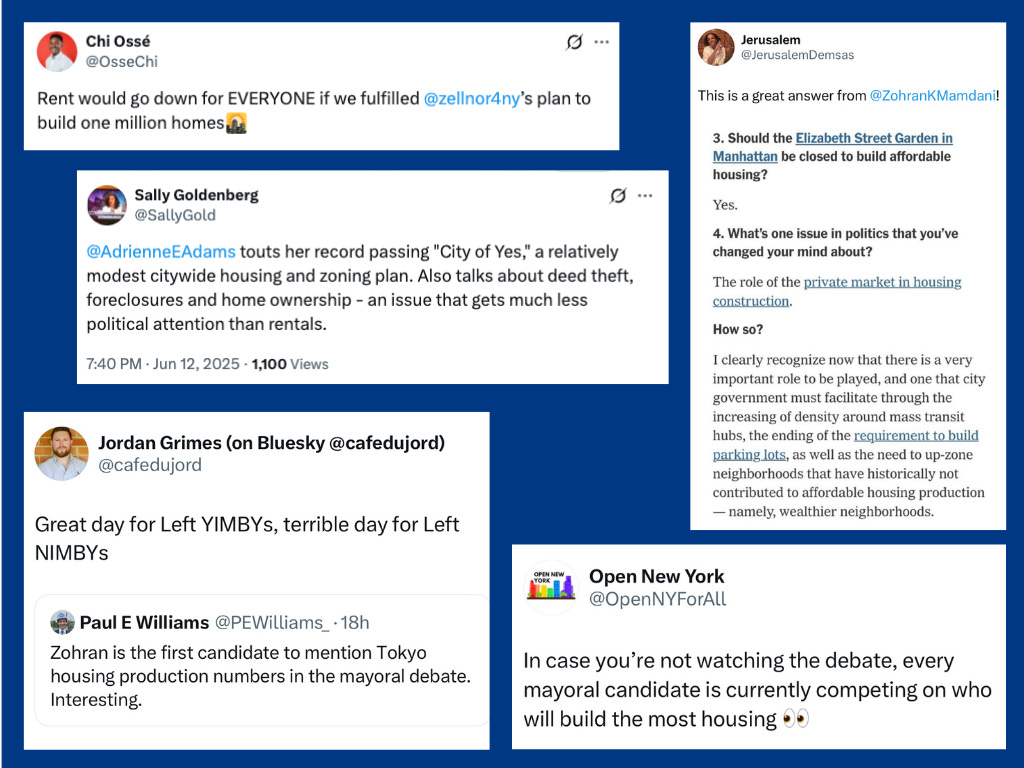Reminder: tomorrow is the start of early voting, and the last day to register! On your voting checklist: double-check your registration, find your polling place, and read our Voter Guide.
The leading seven mayoral candidates faced off last night in the second and final debate, and we were glued to the screen—watching for signs of potential shifts to the race, and for evidence of how arguments about policy have changed in New York since past cycles.
The gloves were off: as in the last debate, candidates piled on Cuomo, calling out his record of sexual harassment, alleged cover-up of nursing home deaths, and questionable residency in the city. But hits also came at Mamdani, and not just from the moderates: Adrienne Adams questioned if Mamdani considers himself more qualified than she is; Stringer positioned himself as the only candidate who could combine Mamdani’s vision and Cuomo’s experience; and Lander suggested that Mamdani’s social media following wouldn’t translate into management skills while touting his own kind-of New York Times endorsement. (At the end of the day, no love was lost between these two: today Mamdani and Lander announced they would cross-endorse each other, the first true mayoral cross-endorsement in the RCV era.)
A less crowded stage gave candidates more time to lob omnidirectional insults—but also to get deeper into policy. Candidates took on public safety, class size, and funding for city services under the Trump administration.
Most striking to us? The conversation about housing policy, which showcased just how far the Overton Window has shifted across the mayoral field.
Mamdani has campaigned largely on demand-side housing policies that wouldn’t address the housing shortage, but last night he cited both Jersey City and Tokyo as models for increasing our housing supply. Indeed, earlier this week, he told the New York Times that the issue he’s changed his mind about is the role of the private market in housing construction. Cuomo, whose own tenure saw scant housing built in the state, admitted the need for a “full-on assault” to build affordable housing (though he carefully avoided any mention of increasing density in the outer boroughs).
Our community has played an important role in shifting the discourse on housing. We’ve supported champions like Zellnor Myrie, whose plan to build one million homes challenged the rest of the field to issue more ambitious housing proposals. And we’ve engaged electeds up and down the ballot—including Mamdani—and made the case for market-rate development as both smart and progressive policy in a city hobbled by a housing crisis. It was once politically inconvenient to stand for pro-housing policies. Now it’s not just expedient—it’s required.
It’s too soon to tell whether the debate, the Times opinion panel, and the Mamdani-Lander cross-endorsement will shake up the polls. But as early voting starts, let’s remember that we’re not just observers.
As is true in all things local politics, the fate of the race is in our hands.
How you can get involved
Tomorrow is the last day to register as a Democratic voter in New York, and the first day of early voting! Here are a few ways you can get involved:
Share our Voter Guide with friends and family who live in the city. Municipal elections can be confusing, and voters are hungry for information about what’s on the ballot, who’s running, and how they plan to move our city forward. Our guide has all that and more.
Sign up to volunteer for abundance champions. All of our recommended candidates will be out in force during early voting—sometimes together! Tomorrow and Sunday, Council District 1 candidate Jess Coleman and Manhattan Borough President candidate Keith Powers are having joint Abundance Visibility shifts—come join the fun!
Don’t forget to make your own plan to vote! Check your registration, find your polling place, and re-read our Voter Guide to make sure you’re prepared to cast your ballot.



